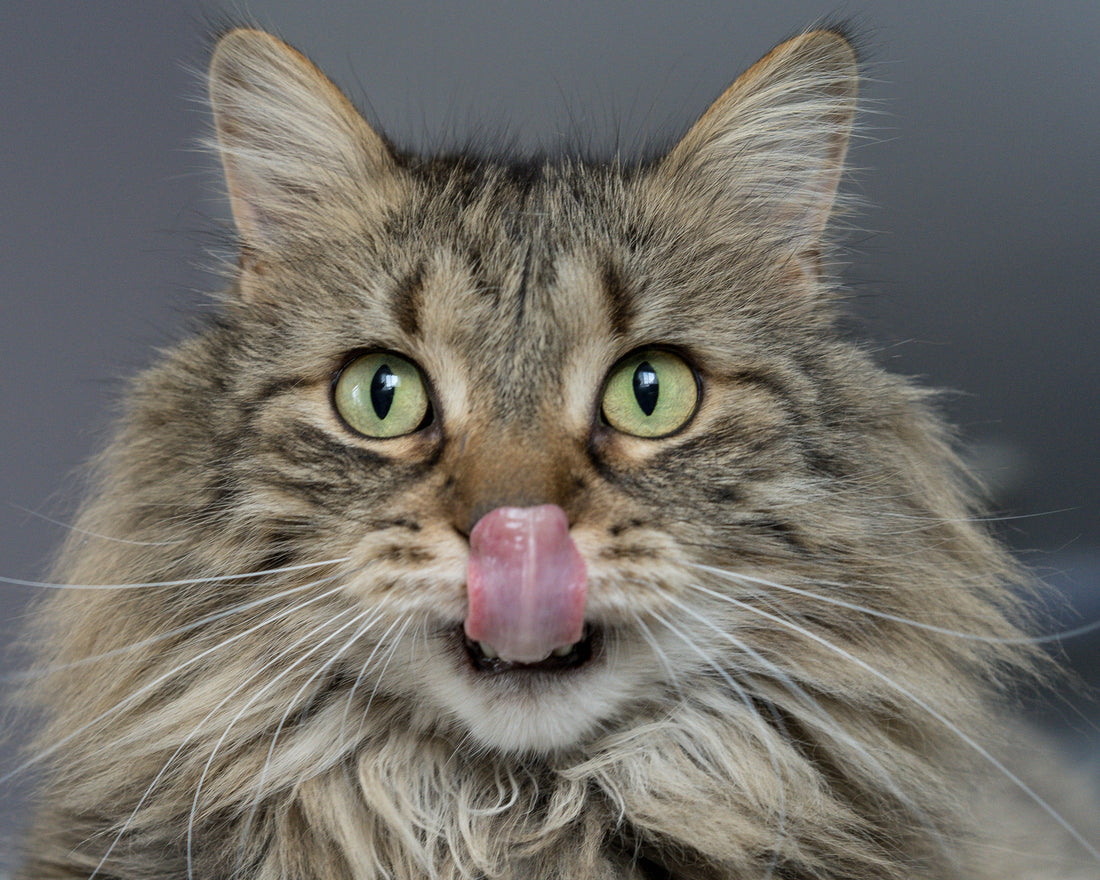Have you ever gone to your kitchen for a late-night snack and stepped in something slimy and squishy?
Have you ever heard your cat hacking, gagging, or retching?
Anyone who owns a cat is well aware of the dreaded… HAIRBALLS!
Most cats develop hairballs from time to time, and they are typically nothing to be concerned about, however, if your cat is dealing with hairballs regularly, you should have them assessed by a veterinarian for any possible underlying health issues.
What is a Hairball?
To be precise, a cat hairball is hair that has collected in the stomach from the cat grooming itself.
If you have ever had a cat lick you, you know their tongues feel rough. This is because Cats’ tongues have barbs that are designed to catch loose and dead hair, which is then swallowed. Although the majority of this hair passes all the way through the digestive tract, sometimes it remains in the stomach, and once there, it can combine with digestive juices, forming a hairball.

What Causes Hairballs in Cats?
Long Hair: Because cats are pretty into grooming themselves, it makes sense that cats with longer hair suffer from hairballs more than those with short hair.
Poor Nutrition: When a cat’s diet lacks proper nutrition, it causes their skin and coat health to decline, leading to excess shedding, which in turn leads to more hair being ingested when grooming.
Allergies: Just as a poor diet can lead to shedding, allergies can also contribute to issues with skin and coat.
Stress and Anxiety: When a cat suffers from stress, they will often begin to groom themselves excessively, a behavior that can cause hairballs.
Are Hairballs Normal?
As annoying and upsetting as they may sound, (yacking, retching and gagging), and as yucky as they may be to clean up (or step in), hairballs are totally normal, and the result of a cat grooming itself.
Cats occasionally have hairballs, which is normal, but if they occur more than 1-2 a month, it can be a symptom of an underlying health or digestive problem.
And although cats suffer from digestive upset for many reasons, including illness, disease, viruses, and even stress and anxiety, it’s important to know that hairballs are also a potential cause, and should be considered when evaluating a cat for any type of digestive upset.
Cats have a good reason for vomiting up hairballs, and that's to prevent them from entering the digestive tract. Once in the digestive tract, a hairball can easily cause a blockage, something that is considered life-threatening and requires surgery.

When to be Worried About Hairballs
While most cats do experience occasional hairballs, if they are occurring frequently, it is a sign that something is wrong.
Consult your veterinarian immediately if your cat is experiencing any of the following symptoms:
- Gagging, retching, or hacking WITHOUT throwing up a hairball
- Lethargy lasting more than 12 hours
- Lack of appetite
- Diarrhea
- Vomiting
- Constipation
How to Prevent Hairballs in Cats
Brush and Groom
Brush your cat or have them groomed regularly. This will prevent them from ingesting excess dead hair when they are grooming themselves. Taking the time to brush your cat is also an excellent way to bond with them and let them know they are loved.
Nutrition
A diet rich in animal-based proteins will provide your cat with the essential nutrients it needs to promote healthy skin and coat.
More Fiber
Increasing fiber can help prevent hairballs from forming, as well as reduce digestive upset. An easy way to add fiber to your cat’s diet is with a daily supplement like a soft chew, or a powder that you can easily add to their food.
Probiotics
Add a daily probiotic supplement to your cat’s diet to help maintain proper digestion for everyday health.
Hairball Supplements for Cats

Hairball Gel for Cats: Promote the elimination of hairballs with a gel supplement that’s petroleum-free, high in fiber, and contains Alaskan salmon oil, and soybean oil to lubricate the intestinal tract, allowing hairballs to pass gently and naturally.
Hairball Powder for Cats: Prevent hairballs and naturally promote gentle elimination. This easy-to-use powder supplement contains psyllium seed husks loaded with fiber to naturally and gently allow hairballs to safely pass through the intestinal tract.
Hairball Chews for Cats: These supplements contain real Alaskan salmon oil that’s rich in omega-3 fatty acids to promote healthy skin and a shiny coat, and psyllium seed husks that are loaded with fiber for natural hairball elimination, allowing them to pass gently.
Every Sale Supports a Shelter Pet. Learn More.
Created in Vermont. Learn More.
If you suspect your pet is sick, call your vet immediately. For health-related questions, always consult your veterinarian, as they have examined your pet, know the pet's health history, and can make the best recommendations for your pet.




